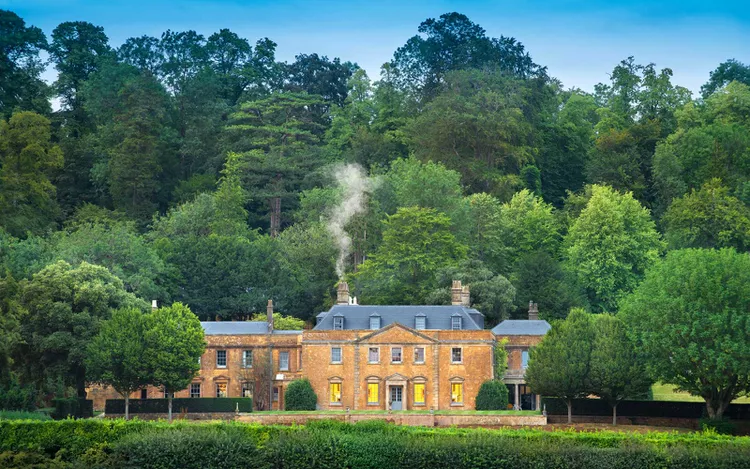The Newt in Somerset: A Luxurious Countryside Experience
It was one of those unbelievable evenings straight out of a J.M.W. Turner painting, the sky flushing peach over the gilded treetops of the English countryside. I was wandering the grounds of the Newt in Somerset, a 23-room hotel in southwestern England. The estate grounds are open to the public during working hours, but the last day-tripper was long gone—dusk had all but fallen—as I swung open a wrought-iron gate and stepped through a door in a high brick wall.
Inside, I found a huge, mazelike garden lined with more than 260 varieties of apple trees from counties across the U.K. (Northumberland, Nottinghamshire, Norfolk read the stone inscriptions lining the path.) Some fruits were red, some green, others a soft russet bronze; each hung on a perfectly trained branch. Alone in this atlas of apples, as the lights from the main house glowed in the distance, I had that rare, precious sense of stumbling upon something I wasn’t supposed to see.
A Unique Experience for Shelter Dogs
If the pleasures of the landlocked, cider-producing county of Somerset were ever a secret, then the arrival of the Newt—one of the most eagerly anticipated British hotel openings in years—is likely to change that. Why the excitement? Because the Newt is owned by a South African hotelier named Karen Roos and her telecom billionaire husband, Koos Bekker. Their first property, Babylonstoren, an 18th-century estate in the wine region outside Cape Town, is a remarkable destination that captures the imagination of travelers.
Those who visit will be relieved to hear that the Newt has all the makings of a follow-up hit. It’s evident from the moment you drive through the discreetly signposted gateway and round a corner to find a scene reminiscent of a BBC costume drama: the classical Georgian façade of the hotel’s main building, Hadspen House, flanked by lawns, topiary, and perfectly graduated evergreens. “For me, Somerset is the heart of England,” Roos said when I asked why she had chosen the county. “It is the land of King Arthur, cheese, and cider.” And choosing this property was a no-brainer. “It was the most beautiful small English country house I ever saw.”
The Historical Significance of Hadspen House
However, the appeal goes deeper than bricks and mortar. As I stepped through a limestone portico and into the main building, a South African front desk clerk named Pip Jansons explained how the history of Hadspen House had helped close the deal. “Karen was inspired by the story of Emily Hobhouse, the great-granddaughter of the original owner,” he said, pointing to a portrait of Henry Hobhouse II, who founded the estate in the 1700s, that hangs on the drawing room wall.
The Hobhouses were a family of activists, politicians, and conservationists. Emily is best known for her work in South Africa, where she traveled during the Second Boer War at the turn of the 20th century to help draw attention to the suffering of the Boer people held in British concentration camps—a group that included members of Karen Roos’s family.
As work on the Newt took shape, Emily Hobhouse became something of a spirit guide. In my room—one of four cozy, contemporary guest quarters in the former coach house—I found her biography on the bookshelf, next to a wood-burning stove and a counter stocked with fresh apple juice and house-made shortbread. After my evening walk, I headed to the bar and ordered a cocktail named the Emily, made with apple-blossom cordial and (what else?) Somerset cider brandy.
Modern Comforts Amidst Rich History
For all its history, the Newt manages to feel distinctly up-to-date. Take the bar, a wood-paneled salon painted deep Prussian blue and hung with a collection of gilt-framed portraits. The effect could be fusty, were it not for the shocking-pink and orange woven chairs and the chic brass shelving. Nearby, in the Croquet Room, guests can swing in a Patricia Urquiola chair and play music on the vintage record player. In one of the gardens, you’ll find a cluster of man-size rattan “nests” by South African sculptor Porky Hefer—a hit with the resident flock of chickens.
What really strikes you as a guest at the Newt, though, is the sense of ambition and attention to detail. Roos and Bekker clearly do not do things by halves. There’s a spa that wouldn’t be out of place in an Alpine retreat, with a hammam, thermal mud chamber, and indoor-outdoor hydrotherapy pool—where I soaked in steaming, bath-temperature water with the September sun on my face.
The property also boasts a full-fledged cider mill, employing cold-fermentation techniques to bottle more than 25,000 gallons a year. The estate maintains 60 acres of apple orchards, where 3,000 trees thrive. Furthermore, there’s a special venue for enjoying cider, the Cyder Press Bar, a Victorian greenhouse, a farm-goods shop, and even a high-tech mushroom house.
Culinary Delights in the Heart of Somerset
Food is undoubtedly a major focus at the Newt. The skate wing with buttered shrimp I savored in the Botanical Rooms restaurant was one of the most decadent fish dishes I’ve ever eaten. Alan Stewart, the talented chef at the Garden Café, served a perfectly seared pork chop, accompanied by roasted garlic and vegetables sourced from the nearby produce garden.
However, I kept returning to those gardens, which somehow feel like the heart of the Newt. By the time I’d finished breakfast each morning, the grounds would be alive with activity—toddlers splashing in the fountains, retirees enjoying the free garden tour, and everyone savoring their visit in true British style, with tea and cake at tables set out in the sun. If it had been memorable having the place to myself, it was magical seeing it come to life.
Getting There
The Newt in Somerset can be reached via the Great Western Railway service from London Paddington to Castle Cary, which takes one hour and 40 minutes. The hotel is conveniently located just a 10-minute drive from the station.





